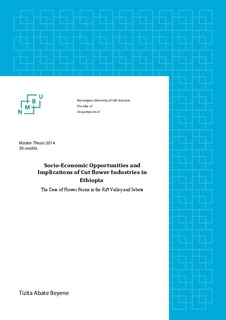| dc.description.abstract | Rose flower production and export has emerged as major foreign exchange earner and source of employment in Ethiopia. This young and fast growing industry gave rise to social and economic concerns which were also part of the wider debate about the social and economic implications of global trade under liberalized trade regimes. This thesis attempts to explore the economic and social opportunities and challenges of rose flower production and export in Ethiopia. Specifically, it looks at the benefits of flower industry for workers who are employed in the sector. It has also examined the labor, health and safety conditions and regulations. In this regard flower farms adherence to core labor standards and government efficacy in enforcing ILO core labor standards and national labor laws proclamation are scrutinized. Finally, it discusses the gendered impacts of the industry by analyzing the characteristics of the workforce and the nature of employment. The study employed qualitative research approach as the principal method to collect, analyze and interpret primary data. The empirical data of this study was collected using techniques such as semi-structured interview, focus group discussion, key informant interview and observation.
The findings indicate that flower farms opened up employment opportunity particularly
enhanced women’s participation in labor market. They remained attractive sources of
employment as they provided stable income in the context of economic vulnerability rooted in landlessness; high youth unemployment and few available livelihood alternatives in rural areas. Nonetheless, low quality jobs with limited employment benefits and barely no legal entitlements especially for majority of women who remained at the bottom rung of the industry's workforce calls for serious concerns. In conclusion the labor, safety and health conditions reflect the challenges to adhere to ILO core and technical labor standards and efficacy in enforcement of national labor proclamation in the context of flexible labor arrangement. It also raises a concern regarding the potential social and economic impacts of labor intensive industries in towards poverty reduction in developing | nb_NO |
